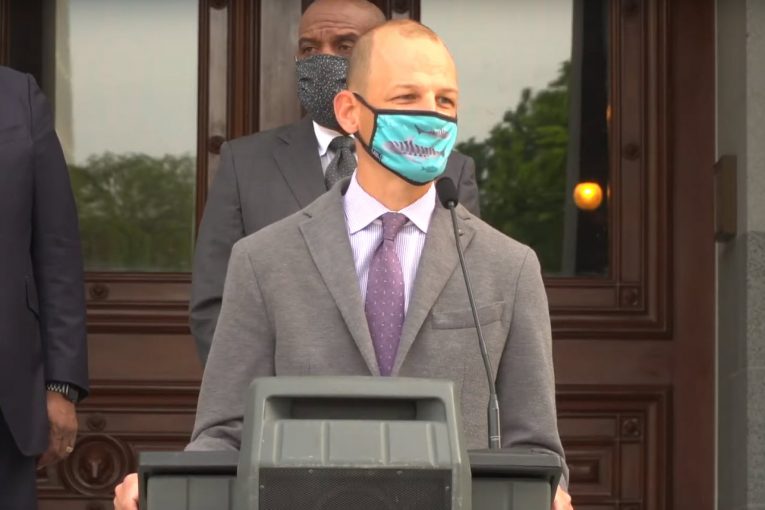
By David M. Greenwald
Sacramento, CA – Four weeks after the bill sailed through the Assembly on a 65-1 vote, Assemblymember Kevin McCarty’s AB 1542, passed through the Senate Public Safety Committee with no opposition votes.
AB 1542 was authored by Assemblymember McCarty in partnership with Yolo County District Attorney Jeff Reisig and Yolo County Supervisor Gary Sandy. State Senator Bill Dodd is a co-author.
It would allow Yolo County to develop a secured treatment facility for individuals who are involved in the criminal justice system and who live with substance use disorders.
According to a release from the district attorney’s office, “Those eligible for the treatment program would include people who have committed drug motivated felonies that, absent this program, would result in them being sentenced to jail or prison. Those who commit misdemeanors, simple drug possession, sex offenses, and strike offenses would not be eligible.”
The release explained that those eligible would be “assessed by treatment providers who would decide the level and length of treatment.”
Those found suitable for the program “would be given a choice of serving time in jail or prison, or entering the soft secured facility where they would receive treatment to help them get well.”
In addition, the DA claimed, “Once they have completed the secured inpatient program, they would move to a residential treatment facility or receive intensive outpatient treatment.”
All of this remains “contingent on the assessment and recommendation of the treatment providers. After completing the program, the subject’s current charges and prior drug convictions would be dismissed and expunged from their record so they can get a fresh start.”
Senator Scott Wiener said, “When drugs are interacting with someone’s commission of a crime how do we deal with that in a way that’s not simply punitive, in a way that actually is getting people the help that they need?”
Wiener asked a number of questions raised by his constituents and concluded, “I’m going to support moving this out of committee today because I know the author is operating in good faith and I know where his values lie in terms of criminal justice reform.”
Senator Sydney Kamlager had a number of concerns and said she wanted to see the amendments to the bill before supporting it.
She concluded, “I do want to make sure it gets out of this committee because I have faith in the author and sometimes you have to create radical alternatives to get different outcomes.”
Chair Steven Bradford (Gardena) expressed his concerns and stated, “I see a need for something like this because, as you stated, the majority of people who go to prison who go there with an addiction usually get out with that same addiction because we don’t have real rehabilitation in our prison system or jail system so this affords an opportunity for the rehabilitation I would hope for and reduced recidivism.”
There remains strong opposition in the reform community.
Back in April, Tyler Rinde, with the County Behavioral Health Directors Association of California, told an Assembly committee that he opposed the bill, arguing “compulsory or coerced SUD treatment is not an effective means of promoting positive clinical outcomes for individuals with substance abuse disorders.”
Rinde added that “offering locked treatment as an alternative to incarceration when the individual would not have otherwise accepted treatment outside of this situation can foster distrust between treatment providers and clients.”
The Human Rights Watch has also been a strong opponent.
In a letter to the Assembly, they wrote, “It runs directly counter to the principle of free and informed consent to mental health treatment, which is a cornerstone of the right to health. Conflating health treatment and jailing, as envisioned by AB 1542, risks substantial human rights abuse, is ineffective as a treatment, and takes resources and policy focus away from initiatives that are much more likely to help people.”
“Coerced treatment isn’t proven to be better than voluntary treatment, it doesn’t have better outcomes to threaten people with incarceration or force them into a locked facility,” said Glenn Backes, a social worker and Public Policy Researcher with Drug Policy Alliance told the Vanguard in March.
He also noted that the cost of such a program is much higher than a comparable voluntary program, and he argues we have not invested in an adequate voluntary treatment.
“It is much more cost-effective to invest to create the treatment opportunities, housing opportunities in the community to get people off the streets and to reduce their drug use rather than to threaten to put someone in jail if they don’t do this,” he said. “To put someone in jail is not cost-effective and it’s not science-based.”
Community treatment in Yolo County and in California is up, he said, as we have invested money saved from reduced incarceration into voluntary treatment—the problem, he said, is that we lack enough facilities right now to handle that voluntary treatment.
McCarty stated, “Hope Yolo is about finding ways to deal with the addiction crisis that we see every day. I am committed to perfecting this legislation as much as possible because our goal is to save lives. The longer we wait the more lives it will cost.”
AB 1542 will next move to the Senate Health Committee.
—David M. Greenwald reporting


What indication is there that the author and originators of this bill are committed to addressing the concerns raised? Answer: There is none. The Senate Public Safety Committee failed to do its job and simply passed the buck to the next and final policy committee that will hear the bill. The result is likely to be the same.
It seems like Kamlager, Wiener, and Bradford are giving McCarty the benefit of the doubt here. Kind of a baffling thing to watch.
Why isn’t there a little picture of Waldo Weiner photobombing the poster above?
Real question – why does pointing out his photobombing so upset the censors?